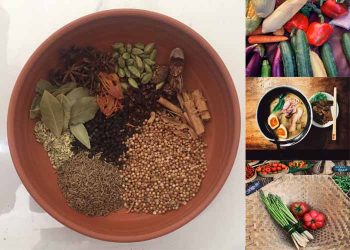Traditional rice varieties of Sri Lanka
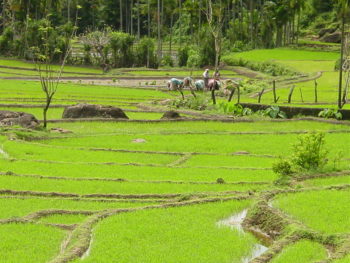
Rice is the staple food of Sri Lanka and many other countries. Over 2000 different kinds of traditional rice varieties are being cultivated in Sri Lanka. Almost all those traditional rice varieties have been organically grown under natural conditions without the application of agro chemicals and inorganic fertilizers. Therefore the traditional rice cultivation is 100% environmental friendly as sustainable food production methods are been practiced by Sri Lankan traditional farmers.
Traditional rice varieties have been cultivated from ancient time. King Devanam Piyatissaruled the country in 370 BC, constructed many water tanks for paddy cultivation. Later King Wasahabha,King Dhathusena, King Prakkramabahu, King Mahasen and many other kings who ruled the country had given their priority to build big tanks to reserve water specially for paddy cultivation.
People believe that our traditional varieties have higher medicinal and nutritional values. Sri Lankan traditional doctors have used many of these traditional rice varieties such as Kalu Heenati, Sudu Heenati, Maa Wee for the preparing of herbal medicines.
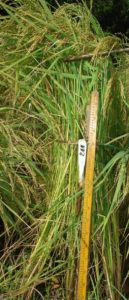
Some of our traditional rice varieties have an aroma (good smell) and higher nutritional value. They have a high content of dietary fibre which reduces illnesses such as constipation and because of this they have slow release of sugar (low glycaemic index). This feature is favourable for diabetic patients to maintain a low blood sugar level after taking meals. Most important characteristic of the Sri Lankan traditional rice is that they are rich with antioxidants which help to reduce the risk of cancers. Though they have better qualities these native varieties are low in yield. During rice processing the most important part of the rice grain can be removed therefore it is advisable to consume whole grains rather than the polished grains.
Special characters of some traditional varieties.
- Pachcha Perumal
Tall stem(120-130 cm) with high tillering ability (7-8) Small grain size(30 grams per
1000 grains) with red pericarp. Yield is around 2.5 mt/ha. Traditional doctors used
this variety for medicinal purposes.

- Kalu heenati
Moderately tall stem(111-115 cm) medium long grain size(24.1 grams per 1000
grains) with red pericarp. Yield is around 1.5 mt/ha. This variety is considered as a
medicinal rice variety for Ayurvedic medicines.

- Sudu heenati
Moderately tall stem(112-135 cm) medium long grain size(25 grams per 1000 grains)
with red pericarp. Yield is around 2-2.5 mt/ha.
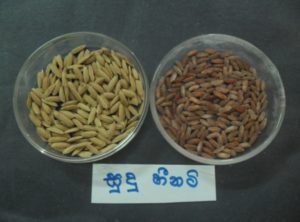
- Rathu heenati
Moderately tall stem(95-115 cm) Small round grain size(17 grams per 1000 grains)
with red pericarp. Yield is around 1.5 mt/ha.
- Rath ell
Tall stem(130-140 cm) short bold grain size(22 grams per 1000 grains) with white pericarp. Yield is around 2 mt/ha.
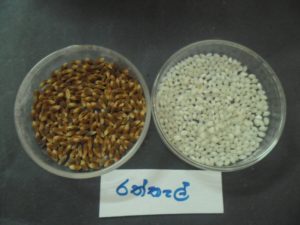
- Suwadel
Moderately tall stem (90-95 cm) medium long grain size(20-22 grams per 1000 grains) with white pericarp. Yield is around 2 mt/ha. This variety has good aroma when cooking.
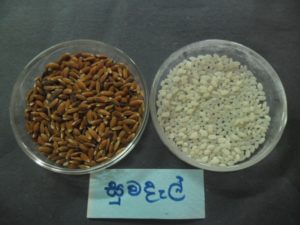
According to recent research conducted by the ITI, it was found that rice varieties namely Kalubalawee,Pachchaperumal,Dahanala,Rathuheenati,Kattamanjal and Rathel having relatively high iron and protein levels and are of high nutritional value and good for anaemic conditions. These varieties can be recommended for pregnant and lactating mothers and also growing children.
Rice varieties such as Kalabala wee,Pachchaperumal,Rath Suwadel and Kaluheenati which possess high antioxidant levels are expected to have health promoting effects in reducing the prevalence of non-communicable diseases such as cancers.
Rice varieties such as Suwadel,Masuran,Dikwee and Gonabaru with low hydrolysis rate ( low glycemic index) are suitable for diabetic patients due to low digestion rate.
Different traditional varieties found in Sri Lanka:
Suwendel
Kuruluthuda wee
Madathawalu
Sulai
Murungakayan
Pachaperumal
Sudu heenati
Kaluheenati
Gonabaru
Kuru Hondarawala
Polon wee
Guru podi wee
Kuru ma wee
Pulli wee
Alagu samba
Guru wee
Pushpa raga
Alagu samba
Allei perumal
Hapumal wee
Mada el
Rasna vaalu
Askarayal
Hata da wee
Rata thawalu
Hathi el
Madei Karuppan
Rath el
Heen deveradhari
Maha maa wee
Bala goda wee
Manikkam
Masuran
Bala murunga
Heen rath el
Rath karael
Bala samba
Heen samba
Molagu samba
Rath Mada al
Bala thatu wee
Heen suvuru wee
Molligoda
Bata kiri el
Hondarawalu
Motakarupan
Mudu kiri el
Rathu bala wee
Beheth heenati
Kahata el
Murunga
Rathu Sooduru
Kahata samba
Niyan wee
Kalu bala maa wee
Kalu Bala Vee
Deveradhari
Kalu handiran
Sudu Maa Wee
Goda wee
Kottayar
Wanni dahanala
Still some of the farmers cultivate some of this varieties in small scale. More than
3000 accessions of traditional varieties preserved at the Plant Genetic Resource
Centre of Department of Agriculture.
K. Rohana Thilakasiri Principal Agriculturist
Rice Research and Development Institute
Bathalegoda.





